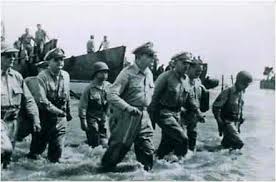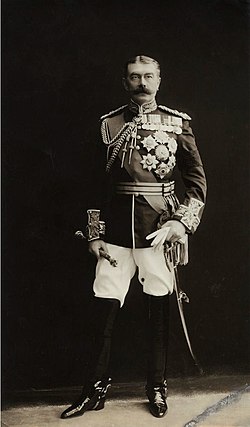Some-times---------------------


Truman:''I've given it a lot of thought, and I have finally concluded... decided that there were times when he . . . well, I'm afraid when he wasn't right in the head. And there never was anyone around to him to keep in line. He didn't have anyone on his staff who wasn't an ass kisser....''
On11 April 1951, US President Harry S. Truman relieved General of the Army Douglas MacArthur of his commands for making public statements that contradicted the administration's policies. MacArthur was a popular hero of World War II who was then the commander of United Nations forces fighting in the Korean War, and his relief remains a controversial topic in the field of civil-military relations.
MacArthur led the Allied forces in the Southwest Pacific during World War II, and after the war was in charge of the Occupation of Japan. When North Koreainvaded South Korea in June 1950, starting the Korean War, he was designated commander of the United Nations forces defending South Korea. He conceived and executed the amphibious assault at Inchon on 15 September 1950, for which he was hailed as a military genius. However, when he followed up his victory with a full-scale invasion of North Korea on Truman's orders, China intervened in the war and inflicted a series of defeats, compelling him to withdraw from North Korea. By April 1951, the military situation had stabilized, but MacArthur's public statements became increasingly irritating to Truman, and he relieved MacArthur of his commands. The Senate Armed Services Committee and the Senate Foreign Relations Committee held a joint inquiry into the military situation and the circumstances surrounding MacArthur's relief, and concluded that "the removal of General MacArthur was within the constitutional powers of the President but the circumstances were a shock to national pride.
"When senior officers, Politicians and the Mandrains of MoD won't see the facts, you've got to do something unorthodox...perhaps an explosion!"
“I am here to tell the truth,” Colonel Billy Mitchell told cheering American Legionnaires upon his arrival in Washington, D.C.
The court-martial (military trial) of William "Billy" Mitchell (1879–1936) in 1925 made headlines because of Mitchell's controversial criticism of the U.S. military. ------------------------------------------------------------ --------------- "It is recommended and requested that Brigadier General William Mitchell be relieved of duty as Assistant Chief of the Air Service. He has given serious offense to the Navy Department by his public utterances and publicity. He has enhanced his own prestige at the expense of and to the detriment of the prestige of his immediate commanding officer. This publicity, if not carried on by him personally, is at least known to him and subject to his control''.
On11 April 1951, US President Harry S. Truman relieved General of the Army Douglas MacArthur of his commands for making public statements that contradicted the administration's policies. MacArthur was a popular hero of World War II who was then the commander of United Nations forces fighting in the Korean War, and his relief remains a controversial topic in the field of civil-military relations.
MacArthur led the Allied forces in the Southwest Pacific during World War II, and after the war was in charge of the Occupation of Japan. When North Koreainvaded South Korea in June 1950, starting the Korean War, he was designated commander of the United Nations forces defending South Korea. He conceived and executed the amphibious assault at Inchon on 15 September 1950, for which he was hailed as a military genius. However, when he followed up his victory with a full-scale invasion of North Korea on Truman's orders, China intervened in the war and inflicted a series of defeats, compelling him to withdraw from North Korea. By April 1951, the military situation had stabilized, but MacArthur's public statements became increasingly irritating to Truman, and he relieved MacArthur of his commands. The Senate Armed Services Committee and the Senate Foreign Relations Committee held a joint inquiry into the military situation and the circumstances surrounding MacArthur's relief, and concluded that "the removal of General MacArthur was within the constitutional powers of the President but the circumstances were a shock to national pride.
Barack Obama's sacking of General : McChrystal,after concluding that his military chief in Afghanistan had badly damaged the chain of command and could no longer work effectively with the civilian leadership at a crucial moment in the war.'Barack Obama sacked the US and Nato commander in Afghanistan, General Stanley McChrystal, saying he had undermined the military's accountability to civilian authority and the war itself with disparaging and contemptuous comments about senior administration officials to a magazine'
''McChrystal’s removal will seriously undermine the American surge, for which Obama and his team feel little enthusiasm in any case. This was one of those rare instances where a general was genuinely irreplaceable. The effect on American troops’ morale will be catastrophic. McChrystal wrote the script for the whole of America’s anti-Taliban strategy and its remaining, time-limited presence in Afghanistan. Combined with the increasing casualties the Taliban is inflicting on Western forces, this is a deadly blow.''
General Thimayya, the Chief of Indian army was a man of guts.On differences with Nehru the COAS had resigned-------






No comments:
Post a Comment